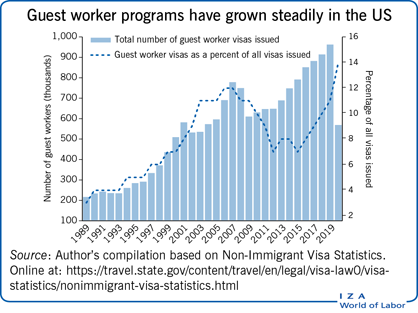Elevator pitch
Guest worker programs allow migrants to work abroad legally, and offer benefits to workers, firms, and nations. Guest workers are typically authorized to work only in specific labor markets, and are sponsored by, and must work for, a specific firm, making it difficult for guest workers to switch employers. Critics argue that the programs harm host country citizens and permanent residents (“existing workers”), and allow employers to exploit and abuse vulnerable foreign-born workers. Labor market institutions, competitive pressures, and firm strategy contribute to the effects of migration that occur through guest worker programs.

Key findings
Pros
Guest worker programs give migrants legal opportunities to earn higher wages abroad.
Firms have advantages in recruiting better workers, and adapting quickly to changing environments.
Nations can fill worker shortages in specific occupations and sectors, attract highly-skilled workers, and benefit from a global workforce.
Destination country taxpayers bear few direct costs.
Guest worker programs regularize migration and offer higher labor standards compared to unregulated migration.
Cons
Guest workers are unable to quit their employer easily without risking their legal status in the destination country, granting firms some power over them.
Firm market power over guest workers can harm citizens or permanent residents (“existing workers”).
Firm market power can lead to exploitation and abuse of guest workers.
Firm strategy may not align with national policy aims.
Some firms may take advantage of workers in sending countries via fees, deception, and fraud in recruitment.